Alfredo asked us to offer ideas for how to fast during Lent:
What to eat during fasting (other than cranberries & coconut oil) is on my mind. Looking for some variation in the fasting menu.
It’s a great question. We did have a post on one possible fasting food – Neo-Agutak: “Eskimo Ice Cream” – but never discussed alternatives or the reasons for eating particular foods during a fast.
Fasts don’t have to be food-free
Some people think a fast should involve no food at all. On the Neo-Agutak post, Don Matesz commented:
I would not say that I was fasting if I consumed more than 625 calories during any period of that “fast.”
But that’s not the position of the Catholic Church. During Lent, Ash Wednesday and Good Friday are fast days. The US bishops allow one full meal and up to two snacks:
The law of fasting requires a Catholic from the 18th Birthday (Canon 97) to the 59th Birthday (i.e. the beginning of the 60th year, a year which will be completed on the 60th birthday) to reduce the amount of food eaten from normal. The Church defines this as one meal a day, and two smaller meals which if added together would not exceed the main meal in quantity. Such fasting is obligatory on Ash Wednesday and Good Friday. The fast is broken by eating between meals and by drinks which could be considered food (milk shakes, but not milk).
Children, the elderly, and those whose health might be threatened are exempt from the requirement to fast.
So let’s consider a fast to be any period of reduced calorie consumption – not zero food.
Basic fasting: Electrolyte and fluid replacement
It is certainly a mistake to consume nothing at all during a fast.
People deprived of fluids and electrolytes die quickly. In a famous case cited in Wikipedia (“Starvation”), Drusus Caesar, son of Agrippina the Elder, was starved to death in 33 AD by the emperor Tiberius, and managed to stay alive for nine days only by chewing the stuffing of his bed. When Saint Maximilian Kolbe and nine others were starved in Auschwitz, seven of the ten died within two weeks.
When fluids are provided, however, survival can be much longer. Even in his 60s, Gandhi was able to go without food for 21 days. In the Irish hunger strikes of 1980-1981, no one who fasted less than 46 days died, and about half those who fasted between 46 and 73 days died.
So fluids and electrolytes extend the duration of a fast by about a factor of four. Since we want our fasts to be safe and health-improving, we should certainly take:
- Water.
- Sodium and chlorine. During a fast protein is converted to glucose and ketones, releasing nitrogen waste in the form of urea. Sodium and chloride are excreted along with the urea. Salt loss can be fairly rapid during a fast, equivalent to as much as a teaspoon of salt a day. A large amount of water is lost along with it.
- Potassium. Potassium is the intracellular electrolyte, sodium the extracellular, and osmotic pressure must be balanced. So potassium will be lost along with water and sodium, and should be replenished with it.
- Calcium and magnesium. These also serve electrolytic functions and it is desirable to maintain their concentrations.
- Acids. These are beneficial for the digestive tract and metabolism, and also for solubilization of minerals. Citrate, for instance, helps prevent kidney and gallstones.
Vegetables are the best source of potassium; bone broth is a source of calcium and magnesium. The best acids are citrus juices, such as lemon juice, and vinegars, such as rice vinegar. Sea salt, or salty flavorings such as soy sauce or fish sauce, can provide sodium chloride. So the most basic food to take during a fast is a soup made of vegetables in bone broth, with salt and an acid added.
Here are some pictures. First, make up a bone broth by cooking bones in acidified water:
It’s best to use a ceramic or enameled pot to prevent leaching of metals from the pot.
When you’re ready to eat, put some scallions or celery and cilantro or basil in a bowl, and add hot broth:
Add salt, pepper, acid, and spices to taste.
Spinach and tomatoes are great vegetables for these broths, because they are rich in potassium. Here is a tomato soup:
Here’s a slightly fancier example. I think this had tomatoes, onions, peppers, carrots, and kohlrabi:
Served with parsley and scallions, rice vinegar, and sea salt:
Adding some food
So far we haven’t provided any calories to speak of. The next step in reducing the stress of the fast is to add some nutrition to the soup.
The stress of a fast is largely due to the absence of dietary carb and protein. The body has limited carb storage – glycogen is depleted early in a fast – and is loath to cannibalize lean tissue for protein. On the other hand, the body has abundant fat reserves. So
Two strategies may make sense in different circumstances:
- A protein-sparing modified fast. Protein, which is convertible to glucose, is eaten to relieve the carb+protein deficit.
- A ketogenic fast. Short-chain and medium-chain fatty acids, such as are found in coconut oil, are eaten to generate ketones. Ketones can partially substitute for glucose utilization.
What these have in common is that they reduce the carb+protein.
Probably 90% of people who fast should favor the protein-sparing approach. Those on ketogenic diets for neurological disorders should probably favor the ketogenic fasting approach.
An example of a food suitable for a ketogenic fast would be Neo-Agutak: “Eskimo Ice Cream” (Dec 5, 2010).
A suitable food on a protein-sparing modified fast would supply most calories as protein; carb and fat calories would be from nutrient-dense sources. Egg yolks, which are rich in phospholipids like choline, and potatoes are good examples of nutrient-dense fat and carb sources.
The easy way to implement this healthy fast: just add eggs, potatoes, and maybe some fish or shellfish (which tend to be protein-rich, and comply with the Catholic guidelines for Friday abstinence) to any of the soups shown above. Heat the soup in the microwave and there you have it: a healthy fast-day meal!
Conclusion
Those on weight loss diets will notice that by adding protein, carbs, and a few nourishing fats to our fast-day soup, we’re getting very close to our recommended diet for calorie-restricted weight loss diets: see Perfect Health Diet: Weight Loss Version (Feb 1, 2011).
There’s a good reason for that: both posts work from the same design principles. Both aim at the greatest possible nourishment on the fewest calories.
Would you like to lose weight? Consider making these nourishing soups a staple of your diet.
Even if you’re not fasting or trying to lose weight, consider making these soups a regular part of your daily meals. It’s very easy to make a broth on the weekend and warm it up and pour it over diced vegetables at mealtime. You might find them a very satisfying addition to your diet.







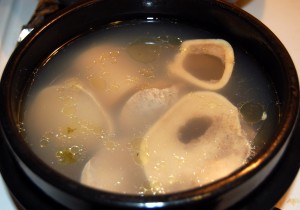
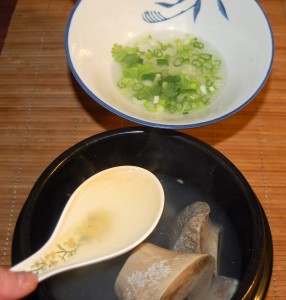
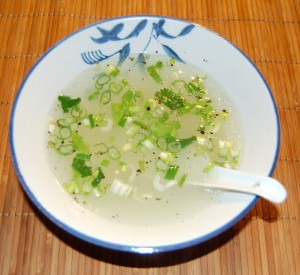
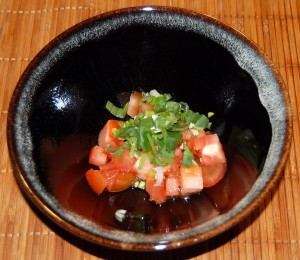
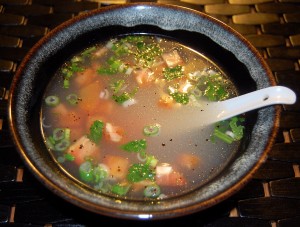
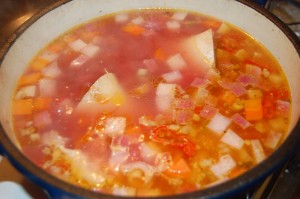
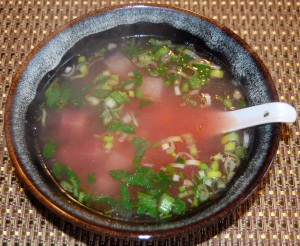




Paul — have you seen the post at Bullet Proof Exec about fasting that was published yesterday? http://www.bulletproofexec.com/rapid-fat-loss-protocol/
No idea if Dave Asprey was thinking of Lent at his blog though!
Hi Simon,
No, I didn’t see that. A five day ketogenic fast seems rather extreme to me. Thanks for the link.
Paul – will eating a 1/2 cup of raspberries or a banana in a small amount of heavy cream diminish the benefits of autophagy that i can expect to get from a daily 16 hour fast?
In terms of the fluids consumed during a fast, would it be better to avoid caffeine based teas or coffee ? I think Paul Chek (in the paleo summit) recommended some fasting teas and juices to keep blood sugar from dropping too low during a fast.
Hi Kevin,
It will diminish autophagy a bit, but that’s OK, you can always extend the fast an hour. We don’t know where stress stops being hormetic and becomes damaging.
Hi Narain,
Tea and coffee are diuretic and so they can promote dehydration. I don’t think it’s a problem on a short fast but on a long fast I’d avoid them. Did Paul Chek recommend sweetening the tea? Blood sugar shouldn’t drop too low on a healthy fast.
Paul, Unfortunately I did not take notes (*slaps head*), but I think he was referring to teas that are “fasting teas” like this one:
http://www.yogiproducts.com/products/details/healthy-fasting/
I dont think he mentioned sweetening it at all. I guess his concept of a fast was no food and hence his advice to drink fasting teas and juice. His advice was to do it about once or twice a week and eat a normal sized meal in the evening after the day fast instead of overeating unlike most of the IF proponents (warrior diet, lean gains etc).
hi paul, thanks again for maintaining such a great blog. happy to report i’ve finished your book, and i hold it near & dear! my mom is reading it now.
i’ve heard people talk about doing ‘fat fasts’ where they limited their food intake to 6 oz of macadamia nuts a day: three 2oz meals of macadamias, to be precise. what do you think of this – essentially a monounsaturated fat fast? it would not be as ketogenic, but do you think it would have benefits?
Hi jake,
I don’t think it would be dissimilar to a total fast.
Hi Paul,
you make reference to what fasts can be from a historical context (e.g. during Lent), but for those that have spent months (years even) studying the actual scientifically measurable physiological benefits of fasting (like Martin Berkhan and Brad Pilon), it strikes me that adding a load of fat and other stuff into the equation quickly starts heading towards negating these benefits. Instead, your fast days just end up becoming calorie restriction days.
I used to do mushrooms + fresh herbs + broth- haven’t done that one in years, thanks for the reminder!
It appears you don’t go for the ‘roast the bones before you boil them’ technique. Is it because of the high heat, extra time. or because there’s no flavor benefit? (Or maybe some other reason).
Hi Victoria,
The high heat is a risk for denaturing fats, but the main reason is simplicity – less to clean up, less to tend to. Simmering water doesn’t need any attention.
Thanks for posting this, I am a traditional catholic (SSPX) so I usually fast every single day during Lent, but I was given a dispensation this year since I decided I should RRARF for health reasons. I like the soup idea!
Hi Paul,
Just a quick question. You mentioned reheating the broth quickly in the microwave. I was always under the assumption and belief that using a microwave destroys the nutritional benefits of foods by rearranging the water molecules and damaging vitamins and minerals in the process? What is your take on this? I haven’t actually looked at hard research on this but I feel I have read things in the past that discussed this.
Hi Shawn,
No, microwaves don’t destroy nutrients. See http://perfecthealthdiet.com/?p=1315.
Hey Paul,
Thanks very much for your response and the post. I read the post, as well as, all the responses. On the whole it would seem as though things are safe. I have been avoiding reheating foods in the microwave for a couple years now, outside of plain water or coffee. Part of me still doesn’t feel completely convinced, however, I trust your opinions and your knowledge base and research. I will stop bugging my wife about heating foods in it.
Not sure if you have a way to contact you privately but I have a few things I’d like to ask you without posting them online for everyone to see. I am a new Naturopathic Doctor, in practice for a year now, and would love to correspond with you from time to time. I know you are not a doctor however, I have shifted my approach with all my patients since reading your book, and getting more involved in the paleo/ancestral movement, blogosphere, book, research world.
Thanks Paul.
Hi Shawn,
If you need to contact me privately, you can find my email address on the “About Us” page.
Hi Paul,
I keep my soup in a steel container and just heat it on slow before taking out some part of it for drinking.
That way I can use it for a long time.
Do you see any issues?
regards
Hi Anand,
Stainless steel is very stable chemically and temperature wise, so it should be very safe. Other types of steel, not so much.
Hi Paul,
there seems to be a confusion when talking about fasts.
Lent (I’m talking mainly about the Greek-Orthodox tradition, I’m from Romania, the Catholics are a bit lax, especially here in Ireland, where they don’t dare ask anything anymore from their followers) means a fast of 40 days, in which no animal products or oil/fat can be consumed, with some exceptions. The exceptions are complicated because they depend on the church’s calendar of that year and on the parish priest, but basically, they refer to the saints’ days that fall in that fast. So, first, Tuesdays and Thursdays are oil days, that is you can cook with it or add it to salads, and Saturdays, Sundays and other big saint day are feast days, that means you can have fish and oil. Otherwise, shellfish is allowed during fast days, but is not available on the continent. Spring Lent is much harder than Christmas Lent, less exceptions.
So the problem is that you can’t have eggs or bone broths. Only boiled veg or salads, beans, rice, potatoes. Lower in protein and some aminoacids. (probably methionine) Yes, Fridays might mean one meal a day, after 3 p.m.
I did one before Christmas and I didn’t miss meat at all.
Paul,
Was curious about your take on this “fasting” approach to hypertension. http://www.ncbi.nlm.nih.gov/pubmed/11416824
Also in the latest Harper’s magazine, there is a story in there all about “water only” fasting, titled “Starve yourself to Vigor”. Was curious on your thoughts on the safety of a water only fast say anywhere from 1-10 days. Thanks
George
Hi Simona,
I guess you could make a soup with mineral water in place of bone broth.
Hi George,
I think our diet does pretty well for hypertension. It’s not necessary to do anything so extreme as a total fast.
The Flexi Diet as we discussed can follow Orthodox Christian fasting requirements with no animal products or olive oil, both of which are restricted at different stages of the fasts, as well as every Weds and Fri.
Hi Paul,
I am into my third day of a bone broth fast that I am doing to see if there is any alleviation of my RA symptoms. I do not need to lose weight and for that reason, I originally planned to keep the fast at three days so I wouldn’t get too thin. So far, I haven’t lost much weight, according to the scale, but I expect it will register soon.
A little background: thanks to the Paleo Solution and then your PHD, I have been able to reduce the weekly dose of methotrexate by half, however, have had slight exacerbation of symptoms lately and am leery of continuing to reduce it in small increments. I have read that fasting can starve pathogens that might play a role in the disease. Since I have noticed some improvement in my joints and 90% clearing of skin problems (eczema, mostly), I wonder if I should hang in a little longer, now that I seem to be over the worst part of the fasting symptoms, rather than start all over. Will I lose the benefits if I break the fast too soon, or will it have a lasting effect?
In addition to the bone broth, I have eaten some marrow, fat and gelatin from the broth bones and a small amount of coconut oil (kcals less than 400 per day). Can pathogens feed on this?
Another reason for doing the fast is to help me determine which, if any, of the foods I typically eat may cause a flare. This is tricky because it means only introducing back one food at a time, as I understand it, which actually seems impossible without starving to death. I will have to modify that approach.
Any thoughts or suggestions would be greatly appreciated.
Thanks Paul, I’m been good at following the PHD eating plan but still not making any dent whatsover in my BP, consistently in the 150’s over 90’s, have been on diovan and felidipine for a couple of years, cardiologist just switched me to Exforge. Been on it 3 weeks, nothing. I keep stumbling across this work on “water only” 7-10 day fasts that dramatically lowers BP and that i posted in my previous comment. I listened to this Thomas Seyfried on a Jimmy Moore podcast and he is a big promoter of a therapeutic water only 7 day fast for all sorts of reasons. Even in your book you have a footnote about him and his advocating of such a fast (p274 PHD), I’m so frustrated with no improvement with my BP, what are the concerns with a water only 7 day fast? Why does it work? It appears that people who have done such a fast maintain their lower BP even after resuming their previous diet, any more advice?
Hi George,
I think the effect is going to depend on what’s causing the high blood pressure. I would do intermittent fasting first. Have you optimized vitamins D, A and K2? Is your appetite minimal? Are you able to exercise?
Long fasts are stressful and it’s good to fix all the basic things before trying one.
Hi Paul,
I would really appreciate if could you mention whether it’s allowed or recommended to eat some food during the 16 hours fasting period and tell which kind of food is allowed to optimize the fastinf benefits ? It seems food recommended is either bone/vegetables broth (only the broth or every part of it ?;) ) and some coconut oil ? So : no carbs at all ? No protein at all ? .. Thanks for your comment ! Best, Maya
Yes. Fasting foods are either ketogenic (coconut oil or MCT oil) or nourishing but calorie-free or low-calorie (water, electrolytes, low-calorie vegetables, as in bone broth soup with tomatoes).
If you want you can nibble on a bit of regular food, such as protein or carbs — nothing wrong with that, but it is diminishing the fast. An alternative is to shorten the fast. Fasting is not for everyone, so you have to be the judge of what’s best for you. In general healthy people will benefit from a 16 hour fast if the 8 hour feeding window is not calorie- or nutrient-restricted.
Best, Paul
Thanks a lot,Paul ! 😛
So reading this, it’s not possible to mix a low-calorie broth with coconut oil ? 😳
When you talk about shortening the fast, what could this be ? I mean 12 hours ? 14 hours..? I suppose the most shorten is the fast, the most decreasing are the benefits ? 😕 Per se,what is the minimum fastening time you would recommend if I want to recover good circadian rythm and an optimal digestive function ? 🙄 Thanks a lot in advance, Best, Maya
Sure, you can do that! It all mixes together in your stomach anyway, both are OK fasting foods so it’s fine to have them together.
Yes, reduce a planned 16 hour fast to 14, or 14 to 12, depending on how you feel.
I think about a 16 hour fast is optimal. All fasts should be shorter then 23 hours and should support circadian rhythms, so substantial food every day, and timed for daylight hours.
But a 12 hour fast is fine too. Also, a fast shouldn’t cause serious hunger. If you get hungry, you should eat something.
The optimal length will vary with different people, but as long as it’s shorter than 22-23 hours and longer than 10 hours it should be good for you.
OK, Thanks a lot Paul. Anyway, last (but not least ) question on this topic 😉 : on a 12 hours fast, how long is the “food window” ? 8 hours ? or 12 hours ? or ..?
Thanks, Best, Maya
on a 12 hour fast the feeding window is 12 hours. Everything is designed to maintain circadian rhythms.
I was curious if anyone knows what the composition of this diet was?
http://www.nytimes.com/2012/08/30/science/low-calorie-diet-doesnt-prolong-life-study-of-monkeys-finds.html?_r=1
I am not certain where you’re getting your information, but great topic. I must spend a while learning more or figuring out more. Thank you for great info I used to be looking for this info for my mission.
Hi Paul,
I’m confused about the length of fast. You recommend 16 hour fast. But, what is considered to be a 16 hour fast?
For example, I finish my dinner at 8 pm on Sunday. I get up at 8 am on Monday (12 hours). If I have lunch at 12 (by skipping breakfast), then this is 16 hours in total without eating anything.
However, 8 hours of this was sleeping. Is this 16 hour fast or not? Or is it just skipping breakfast?
If I continue fasting and skip lunch and have dinner at 8 pm, is this 16 hour fast (because we exclude sleeping time)
In your opinion, what is the best way of fasting for 16 hours (timewise)?
Thanks in advance.
Hi Ugur,
Yes, that’s a 16 hour fast. Sleeping counts.
Having only one meal, dinner between 7 and 8 pm, would be a 23 hour fast.
The only criteria we have is that the overnight fast should be extended to 16 hours, and that feeding should occur during daylight hours if possible. So if the sun rises at 7 am and sets at 7 pm, then we would support a feeding window of anywhere from 7 am – 3 pm or 11 am to 7 pm.
That’s the ideal. Many people can’t finish dinner until 8 pm due to work obligations. That makes noon to 8 pm a natural eating window. That’s what we do.
Hi Paul!
I make this flaxseed mucilage that I drink during my daily fast. I mix 1dl flaxseed with 1 liter water and then boil it for about a half an hour. (to get rid of the possible toxins in the flaxseeds??)
After cooking I throw in about 3 dl of coconut oil which melts in and then I sink the pot in cold water. I then whisk the concoction so it cools and the coconut oil emulsifies neatly into the mucilage. It resembles thick slime porridge with flaxseeds and coconut taste to it. Yummy!
How does this sound for a fasting “snack” and is it healthy? I invented this mixture when my stomach disagreed with the amounts of coconut oil I was putting in. I find this is much more palatable and digests better.
Women and IF – is there a difference – does it cause hormone fluctuations and cortisol increases? Or maybe I am fasting wrong by not eating what you suggest – bone broth, coconut oil, eggs, potatoes. Could you comment on this if you have time 🙂 http://www.paleoforwomen.com/shattering-the-myth-of-fasting-for-women-a-review-of-female-specific-responses-to-fasting-in-the-literature/
Hi Molly,
I think the negative results on fasting are 98% of the time due to eating insufficient carbs and protein. Women are more sensitive to insufficient food, that is why female athletes are so much more prone to the “athlete’s triad” of fatigue, amenorrhea, and osteoporosis than are male athletes. Women are also more likely than men to undereat, especially when doing intermittent fasting.
If you have trouble with IF, then my first advice would be to make a point to add more carbs and protein into the feeding window.
Hello, Paul,
It’s so wonderful to know that you are and answering questions great and small. Here’s a small one: Is soy sauce “allowable” on the PHD, even though it is made from soybeans?
Thank you!
~Bonnie
Hi Bonnie,
Yes, soy sauce is allowable. We recommend gluten-free soy sauces.
Hi Paul,
For a healthy adult, do you recommend doing intermittent fasting (16 hr fast/8 hr feeding) every day??
Thanks
Daisy
Hi Daisy,
Yes, as long as you don’t have adrenal dysfunction or appetite during fasting. If you get hungry during a fast, eat something with potassium (tomatoes, potatoes, bananas, berries), protein, and maybe coconut oil or MCT oil.
Thanks for the prompt reply, Paul
Daisy
My 13 year old son broke his arm yesterday at baseball tryouts and had a titanium rod put in. I am going to make him plenty of home made bone broth to help him recover. Are there any supplements or specific foods that I should give him? He weighs about 113 pounds. Any insight would be greatly appreciated.
Hi Angela,
In addition to the bone broth, 3-7 bowls per week (be sure to include joint material for collagen/matrix), vitamin D3, K2, and A are important — A should come from liver; D3 from as much sun on bare skin as he can get, plus maybe extra D3 supplements to start to get rid of any deficiency (you might ask his doctor to measure serum 25OHD); K2 from a 90-100 mcg MK-7 supplement taken daily, plus aged cheese and other fermented foods; magnesium 200 mg/day; vitamin C 1 g/day.
Other than that, nourishing foods. Plenty of potatoes/tomatoes/green leafy vegetables, good low-omega-6 meats like beef, lamb, and seafood, salmon or sardines once a week, eggs regularly.
Hi Paul,
Thanks so much for the quick response. I figured those would be the supplements you would recommend based on reading the article about the Red Sox. I heard of your first book on Dr. Mercola’s website and I think it’s fantastic. I already was already eating fresh whole foods and very little sugar. Being Italian I still eat some pasta and a little bread. I replaced most wheat products with rice and potatoes and eliminated all vegetable oils. I tell anyone that will listen about your book. You and your wife are amazing people and I appreciate all of your hard work, and for sharing your wealth of knowledge. Everone should eatbthis way. I will update you on my sons recovery.
Hi Paul,
I just wanted to post an update regarding my son’s broken arm. It’s only been a week since I started giving him the Vitamin D3,K2 MK-7, calcium and magnesium, so it’s too early to see any evidence of healing on his xrays. I did notice his skin totally cleared up since he started these supplements. He’s 13, so he had some pimples on his nose, forhead and chin and suddenly his skin looks 100% better. Could it be related to these supplements? If so, which one’s do you think helped. Also I just realized that I posted my comment in “Food for a fast.” I typed broken bones in the search box and that was the page that came up, so sorry about that.
Hi Angela,
The supplements can certainly help – vitamin D is good for skin immunity, the others for general cellular function, so it’s hard to say which helped — “whichever he was deficient in” would be the correct answer.
Dear Paul,
Just made my first bone broth this weekend. (simmered bones for 8 hours) It gave a really meaty gelatin like soup.
I was wondering; would you recommend a meaty bone broth soup (which tastes really full, when cold it’s almost jellie) during a 16-hour fast? (w. the 8-hour feeding window)
I’m fasting for the reasons mentioned, mostly for autophagy.
Hi Maarten,
It’s a nourishing food which would normally be part of the 8 hour feeding period, not a fast. In addition to soups, it can be used to flavor curries, stews, and other dishes.
However, a meaty soup does make a great breakfast. So if you decide to shorten your fast with some food, this would be a great choice.
Hi Paul,
Thank you so much for your reply. Would you be so kind to write down which foods you eat during a 16-hour fast? Some confusion arose from reading your different articles.
A lot of the confusion arises from the articles and comments being aimed at two different types of fast.
One is the quasi-religious fasts of long duration and the other type is intermittent fasting to promote autophagy.
During the former, Paul recommends consuming some calories and broth so as not to be in a state of starvation.
During the latter it is necessary to stick to water or at most, consume ketogenic oils such as MCT or coconut oil. It may be that even these oils will reverse autophagy, but I doubt it and Paul says they will help with hunger.
Hi Paul! I found a study from pubmed.com demonstrating high concentrations of lead(up to 9 micrograms)in bone broth from organic chicken bones. Blood toxicity is said to be reached at 5 micrograms from my reading.
Here is the link:
http://www.ncbi.nlm.nih.gov/pubmed/23375414
What’s your take on this?
pubmed.gov*
Hi Paul! I’ve just rediscovered your website and after following LC Paleo diet, I’ve been experimenting with adding more safe starches to my diet as I stopped getting my period following LC Paleo.
Since you recommend Intermittent Fasting, I was wondering if you could describe Shou Ching’s experience on Intermittent Fasting. There have been more than a few discussions about how IF affects women differently from men and would love to hear your / her thoughts! Thanks!
Hi Kathy,
Shou-Ching likes intermittent fasting a lot.
It is important to get enough carbs, enough calories, and enough nutrients of all kinds. When women run into trouble from IF, they are usually under-eating — either under-eating period, or under-eating key nutrients like carbs.
People who are fasting should always self-monitor and if they experience hunger or adrenal stress should eat. Small snacks of protein and electrolytes (potassium/vegetables, salt) will often be enough to ease the fast.
Hi Paul,
how do you ‘know’ if you are experiencing adrenal stress…(or potentially pushing towards it)…
what are the signs/indicators
Intolerance of fasting, you might feel low back pain, you can google for a more complete list.
I am programming my fasting, and want to ask about 1 meal a day (aka, Warrior Diet).
I would eat veggies, broth, MCT/coconut oil, acids, and some fruit during the daylight hours. In the evening around sundown I would feast.
My question regards the effect of this daily snacking on autophagy. With the goals of health and longevity, as well as HGH elevation, does snacking on greenery and broth disrupt the cells from cleaning out? I’m aware that ketosis is maintained.
After a lengthy water fast, people – even those that have «fructose intolerance» – usually tolerate fructose+glucose in the form of raw honey very well, whereas if they are introduced to starch right away (also fibrous/uncooked fruits), they may do poorly. Indicating perhaps that fructose is very natural for the human body. After all, unlike rodents, we do descend from primates that may have had fruits as their major calorie source for millions of years.
An excellent way in my opinion to break a longer fast is with raw honey and young coconut water. This appears to be common also in Asia/India. For example:
“New Delhi, Aug 28: Anna Hazare, who broke his fast on Aug 28(today) has been advised to stay on coconut water and honey diet, said doctors attending the veteran. According to Dr Trehan, who is attending the septuagenarian, Anna is dehydrated and hence needs rest and it will take 2-3 days for him to recover after which he can return to soft diet.
According to Dr Trehan, who is attending the septuagenarian, Anna is dehydrated and hence needs rest and it will take 2-3 days for him to recover after which he can return to soft diet.”
http://news.oneindia.in/2011/08/28/anna-advised-to-be-on-honey-coconut-water-diet-lokpal.html
Honey is great in the sense that is very easy to digest, has powerful antimicrobial effects, and in fact supplies some benign bacteria (one study found 6 lactobacilli and 4 bifidobacteria species). Young coconut water is very rich in electrolytes (potassium, calcium and magnesium), and easy to tolerate. It is also low in sugar.
I think it makes some sense to take many tablets of activated charcoal to make the mouth and intestines as clean as possible to absorb microbes and toxins, during the fast. They may be chewed and the solution could be kept in the mouth for several minutes/swished around (allegedly a way of whitening teeth). http://www.longecity.org/forum/topic/57519-feeding-rats-activated-charcoal-gives-43-greater-longevity/
1 hour later you´d have some honey. Manuka honey seems to be quite effective, but it could also be that there´s a lot of money involved and that its positive effects are exaggerated (http://www.naturalnews.com/041372_manuka_honey_cancer_natural_health.html), that it is more about honey per se than manuka honey. Ray Peat for example would claim similar benefits just from eating natural sugar like fruits. However, I think honey is a great way of offering protection after the somewhat vulnerability that is created from the charcoal.
Then maybe 30-60 minutes later you´ll break the fast with a gentle meal.
It has been suggested that fasting is like an airplane flight: the danger occurs mainly during take-off and landing. I think one can do great harm if not breaking the fast properly. For example imagine someone breaks a long water fast with a ton of starches, fiber, fats, salt etc. Will the body be able to release enough stomach acid, enzymes etc? Harmful organisms in the foods will perhaps not be properly killed, foods not broken down properly, bacteria may feed on this in the small intestine etc. How will the body react? Perhaps overactive immune system, diarrhea, insomonia etc.
I think the honey+coconut water could also be a preferable alternative for the fast itself, even a short fast. I am not sure adding in vegetables during the fast is all that wise, it could stress the digestive system, immune system etc more than honey and coconut water. The latter two would ideally be almost 100% absorbed in the small intestine giving minimal burden for the body. The carbohydrates will prevent muscle loss as well. I guess a shorter fast could benefit from minimal honey added, like 1 tbsp, whereas a longer fast could optimally provide 100-150 gram honey per day along with 1000 ml coconut water.
Hi Paul,
I was wondering if during an intermittent fasting window one could safely take some supplements (like FCLO, iodine from Lugol solution, magnesium, Vitamin C, selenium, gelatin supplementation) without reducing the effectiveness of the fast? I admit that gelatin supplementation contains some proteins which might not be OK, but all the others seem to be vitmains and minerals which shouldn’t pose any risk.
Thank you,
Mihnea
Do I have to brush my teeth during a 16-hour fast?
Hi Paul,
I’ve been using the vegetable broths with added coconut oil for 16-hour fasting and it is surprisingly very satisfying. Now I’m wondering (for variety) if freshly pressed vegetable juices would be good for fasting benefits. No fruits just vegetables such as kale, lettuce, celery, cucumbers and perhaps lemons. Would these vegetables, juiced disturb the fast at all.
coffee with a 2-3 tbsp of cream during a fast is ok?